
|
Getting your Trinity Audio player ready...
|

Rumi:
Beloved friends,
We gather in a hall beyond time,
where emperors and poets, prophets and thinkers,
sit not in conflict, but in conversation.
You ask what God would say of mankind,
and so the voices of history are summoned—
each carrying a flame of truth,
each reflecting the same sun from a different glass.
Here we will speak of life’s brevity,
of the foolish trade of health for gold,
of the masks men wear to impress the crowd,
of love’s quiet strength against all thrones,
and of the sacred gift of the present moment.
Every word you hear is already inside you.
These figures are not strangers;
they are the voices of your own longing,
your own courage,
your own forgotten wisdom.
Come then.
The table is set, the hour is here.
Let us begin the conversation.
(Note: This is an imaginary conversation, a creative exploration of an idea, and not a real speech or event.)
Topic 1: Time and Mortality — Why Do Humans Live as if Life is Endless?
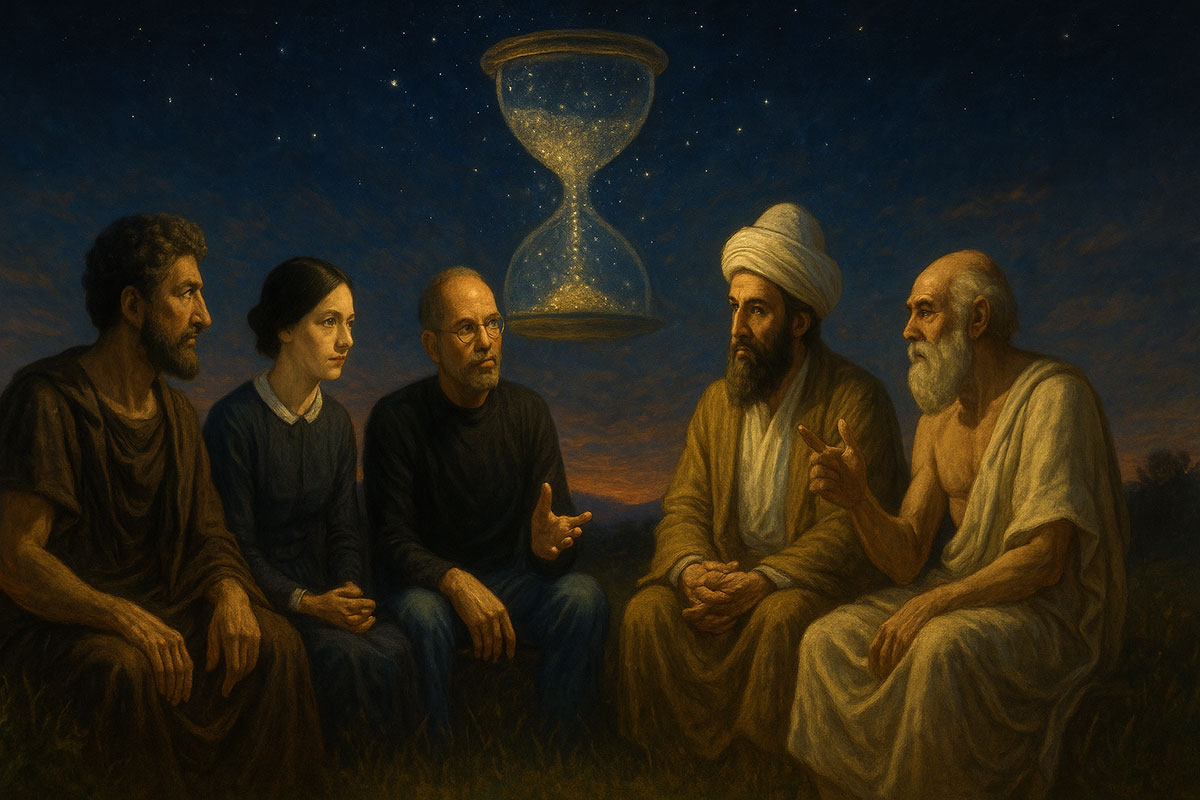
Marcus Aurelius (Moderator)
Friends across centuries, welcome. Tonight we ask: Why do humans live as if life is endless, when death comes for all? We are born knowing the end awaits, yet we act surprised when it arrives. Let me begin with a question: What blinds us to the brevity of life?
Emily Dickinson
Because the ending feels unbearable. To wake each day and hold mortality in one’s hand like a stone—it would paralyze us. So we pretend eternity lies ahead, even while eternity hovers behind us. I wrote, “Because I could not stop for Death, he kindly stopped for me.” Most humans live as though death will wait, because imagining its punctuality is too sharp a pain.
Steve Jobs
I’ll take the opposite view. People ignore mortality not because it’s unbearable, but because they’re addicted to distraction. Our days fill with noise—emails, projects, money, ambition. We drown out silence so we don’t hear the ticking clock. For me, remembering death was fuel. “If you live each day as if it were your last, someday you’ll most certainly be right.” Mortality isn’t unbearable—it’s motivation.
Rumi
Both of you touch the truth. We live as if endless because the soul is endless. The body fears its passing, yes, but the heart knows it returns to the Beloved. You ask why we pretend? Because somewhere deep, we remember eternity. Humans mistake this eternal memory for earthly immortality. So they rush, they hoard, they fear—but what they chase is already inside them.
Socrates
(leaning forward, a wry smile) Perhaps it is ignorance. In Athens, I was called wise because I admitted I knew nothing. And what greater ignorance exists than this: to live as if one knows death is distant, when no one knows whether it is near or far? We do not examine life. We flee from the thought of its limits. To live unexamined is to live as if life is endless.
Marcus Aurelius
You all offer sharp mirrors. Emily, fear of death’s nearness. Steve, distraction in noise. Rumi, a mistaken memory of eternity. Socrates, ignorance of life unexamined. Let us turn deeper: If we remembered daily that life is short, how would we live differently?
Steve Jobs
We’d create with urgency. Every “no” would sharpen our “yes.” I dropped out of college because I knew I didn’t have endless time. Mortality makes you cut the trivial and focus. I lived with cancer for years—it clarified everything. If you knew you’d die soon, you’d stop living by others’ expectations.
Emily Dickinson
I would not rush, Steve. For me, remembering life is short makes each detail vast. A bee on clover, the hush of twilight, the slant of light across my room—each moment becomes a cathedral. Urgency breeds more motion; mortality, for me, bred stillness. You say “create more.” I say, “notice more.”
Rumi
Ah, Emily, yes. To remember death is to remember love. If I knew each breath was my last, I would use it to say, “Come closer, my friend. Sit, drink tea, speak gently.” Urgency has its place, Steve, but the Beloved waits not for what we produce, but how we love.
Socrates
And I would say, mortality asks us to live more courageously. If life is short, then clinging to safety is folly. What use is fear of ridicule, or fear of loss, when all will be lost in time? To know life is brief is to free oneself from cowardice. Live as though your soul is on trial—each act, each choice, a testimony.
Marcus Aurelius
You speak of urgency, of stillness, of love, of courage. Perhaps each path is valid, for each mortal heart finds its medicine differently. Let us end with a final question: What lesson should humanity carry about mortality into tomorrow?
Emily Dickinson
That death is not an intruder, but a host waiting kindly at the door. Do not fear the knock; live so that when it comes, you bow, not tremble.
Steve Jobs
That you should waste no time living someone else’s life. Cut out the noise. Time is too short for inauthentic living.
Rumi
That death is not the end, but the folding of a page in the book of the soul. Welcome each day as both birth and farewell.
Socrates
That the unexamined life is not worth living. And death makes every day’s examination urgent. You cannot postpone truth, for time does not postpone you.
Marcus Aurelius
Then I will close: Death is the natural order. To fear it is to fear the sunrise because night ends. To waste life is to rebel against the very gift we’ve been given. Remember: you could leave this life right now. Let this thought determine all you say and do.
(The conversation quiets. The meadow fades into stillness. The words of five voices linger: fear, urgency, love, courage, discipline. Mortality, no longer avoided, becomes the guide.)
Topic 2 — Health and Wealth: The Human Trade-Off
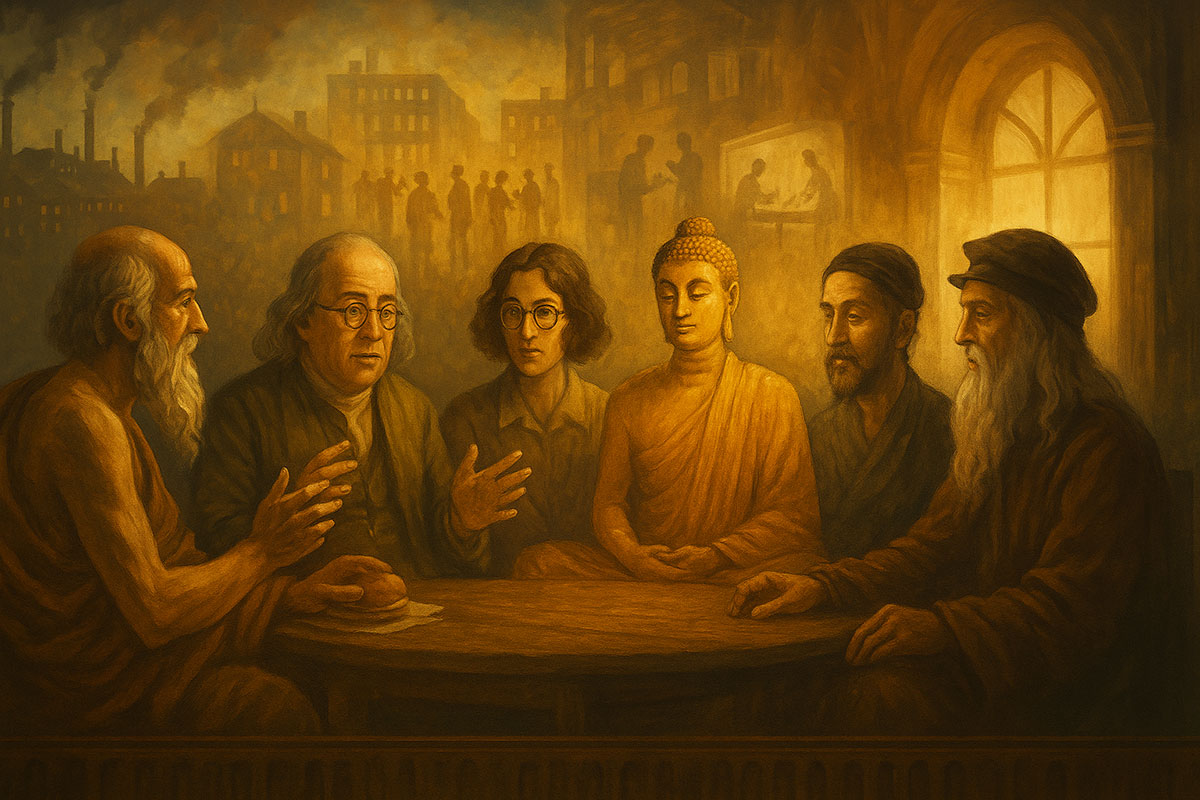
Hippocrates (Moderator)
Friends across time, welcome. I was called the father of medicine, yet the illness I saw most often was not fever or wound—it was imbalance. Even now, humanity sacrifices health for wealth, only to later spend wealth to regain health. Let us ask first: Why are humans so quick to sacrifice their health in pursuit of wealth?
Benjamin Franklin
Because people confuse comfort with happiness. I saw it in Philadelphia—men laboring night and day, believing coins would buy contentment. They call it prudence, but often it is vanity in disguise. “He that is of the opinion money will do everything may well be suspected of doing everything for money.” Wealth can buy a bed, but not sleep. Yet men will risk their sleep to buy a finer bed.
Simone Weil
It is because humans are enslaved to necessity, and then enslaved again to desire. First, they must eat, so they labor. Then, they desire more than bread, so they labor more. The body becomes a tool sacrificed to appetite. In factories, in fields, I saw them crushed—health broken for wages that never healed them. It is not wealth they seek, but escape from despair, and they barter their flesh for it.
Leonardo da Vinci
And yet, it is also curiosity. I knew wealthy patrons who sacrificed health not from greed, but from obsession. Men toil long into the night, not always for coins but for glory, invention, or mastery. I myself painted until my hands ached, dissected bodies until my eyes blurred. Wealth may be the excuse, but often it is the hunger for immortality that burns health away.
The Buddha
At its root, it is craving—tanha. The thirst that never ends. Men and women think: “If I only earn more, I will be secure.” But security is illusion. The fire of craving consumes the body, the mind, the spirit. They sacrifice health because they believe wealth will silence the fire. But the fire grows hotter with every coin.
Hippocrates
Each of you has revealed the disease: vanity, despair, obsession, craving. Let us press deeper. When humans finally turn their wealth to regain health, why does it so often fail them?
Simone Weil
Because what is broken in the soul cannot be bought. I watched men devour bread after hunger, yet their hearts remained hollow. The hospital may mend bones, but it cannot restore innocence lost to toil. Wealth tries to buy back what only grace can give.
Benjamin Franklin
And often they are too late. Men will squander youth for coins, then spend coins to chase youth. But time is not for sale. An ounce of prevention, as I once said, is worth a pound of cure—but most men wait until they need the cure. By then, the price is steeper, and wealth cannot bribe time to turn backward.
The Buddha
Because they seek healing without wisdom. A body may be mended, yet the mind remains restless. Medicine is given, but craving is not addressed. True health comes when desire lessens, when the middle path is found. Without discipline of mind, medicine is like pouring water into a broken jar.
Leonardo da Vinci
Wealth buys remedies, but rarely balance. A man may build a palace to escape sickness, but bring his excess with him into every room. Nature herself heals—the air, the waters, the motion of the limbs, the rhythm of sleep. Gold cannot replace what harmony provides freely. Those who neglect nature in youth cannot purchase her gifts in old age.
Hippocrates
Wise answers. Then let us end with a final question: What lesson should humanity carry forward to prevent this trade of health for wealth, and wealth for health?
Leonardo da Vinci
To live as artist and scientist both: in curiosity, but also in discipline. Eat to nourish, work to create, sleep to restore. Let every pursuit serve harmony, not destroy it. The body is the first machine; maintain it well, and all inventions flourish.
The Buddha
To remember: health is not the absence of sickness, but the absence of craving. Choose the middle way. Neither indulgence nor denial, but balance. In balance, both health and true wealth are found.
Benjamin Franklin
To prize time above gold. Coins lost may be regained, but time lost never returns. Let no man waste his body chasing what will vanish, for no treasure is dearer than a sound body and a contented mind.
Simone Weil
To see that the body is not a slave, but a temple. To honor its limits is to honor God. Let work be just enough to feed the soul, not enough to break it. To remember the poor—whose health is sacrificed for others’ wealth—and to choose justice over greed.
Hippocrates
Then the prescription is written. Live with balance, restrain craving, prize time, honor the body, and let justice guide labor. If mankind heeds this, the trade of health for wealth may yet end.
(The dawn breaks behind the speakers, flooding the stage in golden light. Their voices linger: balance, discipline, contentment, justice, harmony. The echo is less of warning than of invitation.)
Topic 3 — Being vs. Seeming
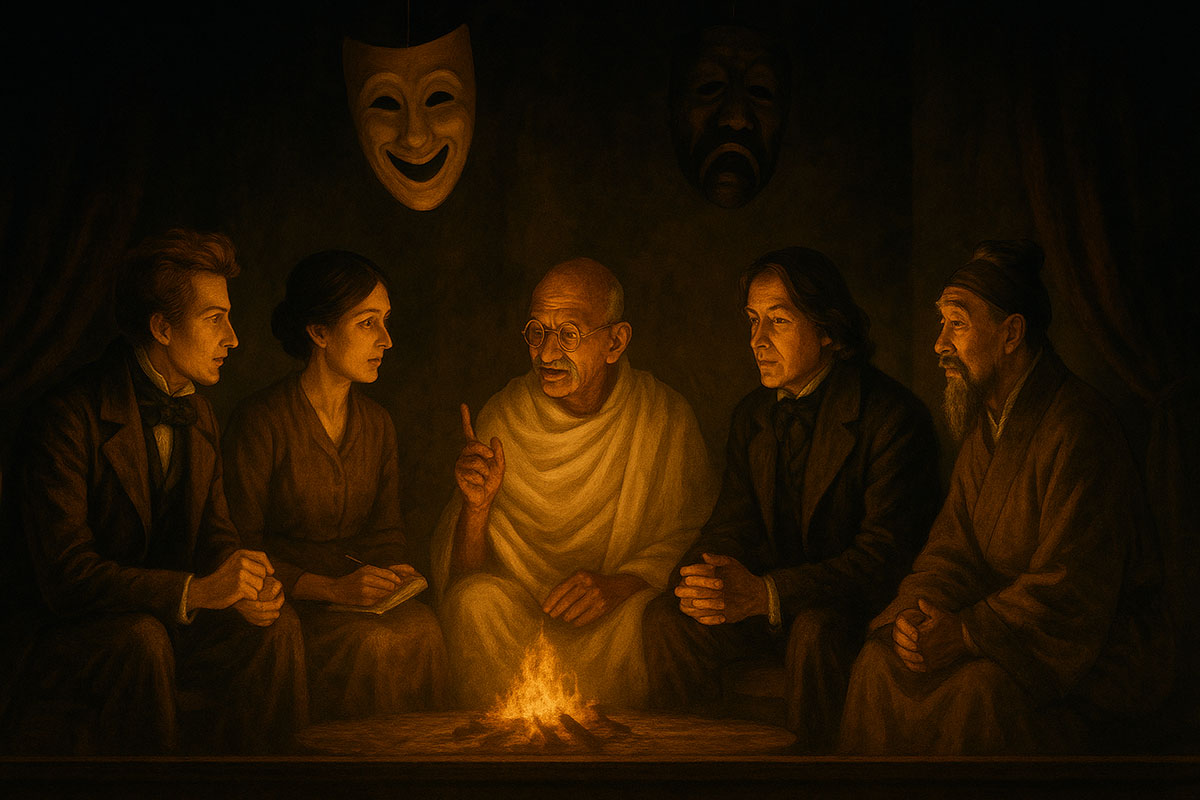
Søren Kierkegaard (Moderator)
Friends, tonight we confront a paradox that haunts humanity: you live as if what others think of you is more important than who you are. The crowd demands masks, and you wear them, even as your soul withers. Let us begin: Why do humans prefer to seem, rather than to be?
Oscar Wilde
Because seeming is so much easier, darling. Authenticity is exhausting. You wake up, you feel dreadful, but society wants you charming. So you put on a smile. Hypocrisy is the grease of civilization. I once said, “Man is least himself when he talks in his own person. Give him a mask, and he will tell you the truth.” The irony is, even masks are honest, in their own twisted way.
Virginia Woolf
I think it is because society builds mirrors and calls them lives. Women especially, in my age, were pressed into roles. One could not be, only perform—as wife, hostess, mother. To rebel against the performance was to risk vanishing from the stage entirely. Humans choose seeming because the price of being is exile.
Confucius
I see it differently. To seem is not always deceit. In my teaching, propriety—li—was the practice of ritual, the appearance of harmony. By acting with dignity, even if you feel rage, you cultivate virtue. Seeming can lead to being. The mask trains the face.
Mahatma Gandhi
Yet, Confucius, the danger is when seeming becomes the end, not the path. I wore the simplest cloth, not to seem poor, but because truth demanded it. I called it satyagraha—holding to truth. Humans prefer seeming because they fear rejection. But freedom begins the moment you choose truth over comfort.
Kierkegaard
So: Wilde sees masks as honesty, Woolf sees society’s mirrors, Confucius sees propriety as training, Gandhi warns of false ends. Each of you shows us the prison. Let us ask: What is the cost of living a life of appearances?
Virginia Woolf
The cost is madness. To live always divided—an outer life for the crowd, an inner life screaming to be heard—splits the self in two. I wrote of Septimus in Mrs. Dalloway, a man destroyed by this split. When the inner voice is silenced long enough, it turns inward and devours.
Oscar Wilde
The cost, my dear, is boredom. Nothing is more tedious than pretending to be respectable. I played the part until prison stripped me bare. There I learned that seeming can collapse overnight. Then what remains? Only yourself—and if you’ve never met yourself, the encounter is… unpleasant.
Confucius
The cost is distrust. A ruler who only seems virtuous loses the trust of his people. A son who only seems filial loses the trust of his family. Seeming without being erodes the bonds of society. Harmony collapses.
Mahatma Gandhi
The cost is violence, both inward and outward. When nations wear masks of civilization but exploit the poor, the mask eventually shatters. When a man wears a mask of virtue but hides greed, he inflicts cruelty. Hypocrisy breeds oppression. The soul rots, and the world burns.
Kierkegaard
And so: madness, boredom, distrust, violence. Then I ask: How can humans reclaim authenticity in a world that rewards pretense?
Oscar Wilde
Ah, authenticity! It is overrated, but delicious. The secret is art. Be artificial on purpose. Make your life a theater, and at least then the mask is your creation, not your prison. Better to be a self-invented fiction than society’s dull truth.
Confucius
I cannot agree, Wilde. Authenticity is in practice, in the small daily acts. Bow with sincerity, speak with care, honor your parents, treat others with respect. Authenticity is not abandoning form, but embodying it until seeming and being are one.
Virginia Woolf
And yet, Confucius, women were taught to bow, to smile, to host—always seeming, never being. For me, authenticity begins with a room of one’s own. Space, solitude, freedom to think. Without that, you cannot hear your own voice over the crowd.
Mahatma Gandhi
Authenticity is costly, but liberating. It demands sacrifice. You must be willing to lose comfort, status, even your life. But what is gained? The strength to say: “My life is my message.” You cannot control how others see you, but you can control how you live.
Kierkegaard
And I will add: Authenticity begins with despair. Only when you feel the sickness of pretense does the leap toward truth become possible. To stand before God, alone, without the mask of the crowd—that is authenticity.
Closing Reflections
Virginia Woolf: “To be is to resist the mirrors that others hold.”
Oscar Wilde: “To be is to wear the mask you choose, not the one chosen for you.”
Confucius: “To be is to practice virtue until appearance and essence unite.”
Gandhi: “To be is to embrace truth, whatever the cost.”
Kierkegaard: “To be is to stand naked before the Eternal, trembling, but real.”
(The stage dims. The masks of society fade into shadows. Only five figures remain, luminous with honesty. Their words echo not as rules, but as summons.)
Topic 4 — What Truly Matters: Love, Kindness, and Humility
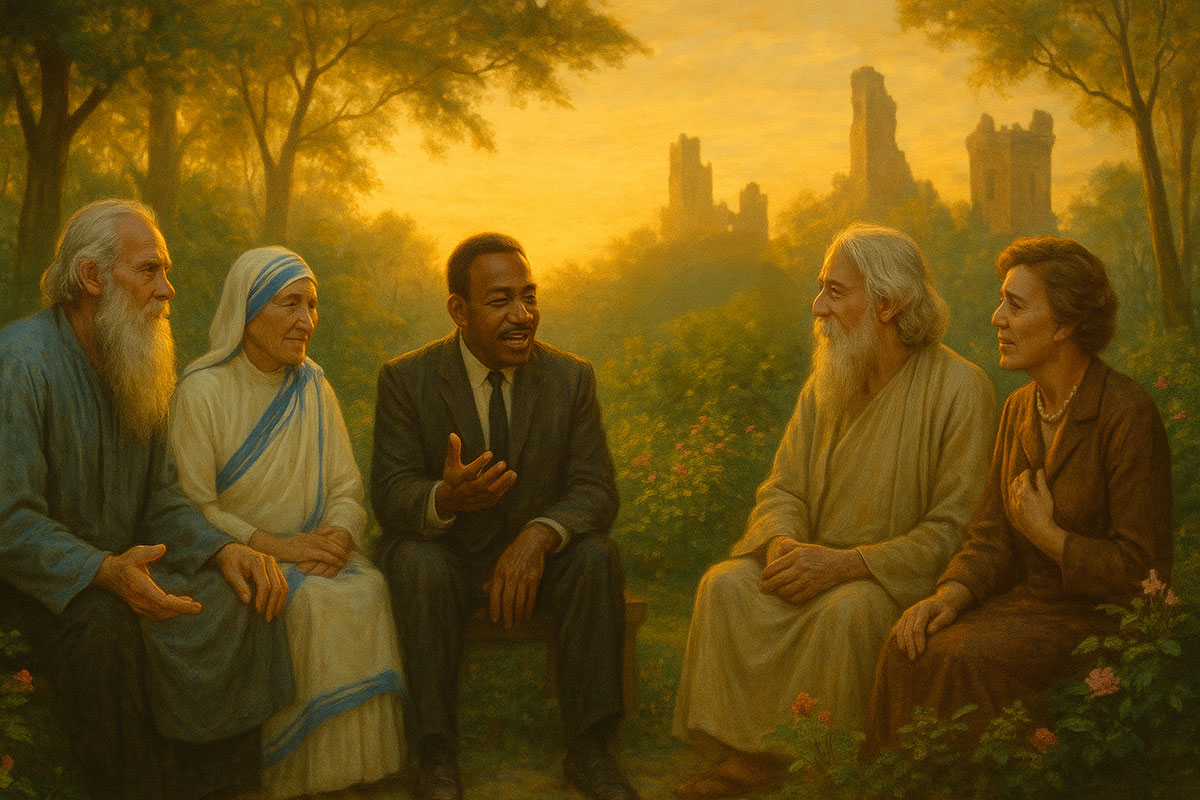
Leo Tolstoy (Moderator)
When I stripped away wealth, fame, and the illusions of my novels, I discovered one truth: only love gives meaning to life. Yet humanity continues to worship power and possessions. Let us begin: Why do humans pursue wealth and status, when love and kindness are what endure?
Mother Teresa
Because wealth dazzles, and love often looks small. A palace seems more impressive than holding a dying child in your arms. But the palace crumbles, and the touch of compassion ripples forever. People are deceived by what glitters, forgetting that the true treasure is hidden in the poor, the hungry, the forgotten.
Martin Luther King Jr.
It is because society teaches us to measure worth in material terms. In America, I watched men judged not by the content of their character, but by the size of their bank accounts. Wealth and power offer quick rewards; love requires patience. But I told my people: “Love is the only force capable of transforming an enemy into a friend.” Wealth cannot do that. Only love endures.
Eleanor Roosevelt
For many, wealth is not about greed, but fear. They pursue it to feel safe, secure, respected. I saw men in politics who clung to power not out of hunger for domination, but terror of being irrelevant. Love asks us to risk vulnerability. Wealth lets us hide. People would rather hide than risk being hurt.
Rabindranath Tagore
The pursuit of wealth is like chasing the horizon. Each step brings it no nearer. Love, however, is here, now—in the song of a child, the light on the river. Humans chase wealth because they are blind to the beauty already before them. They run outward when truth calls inward.
Tolstoy
So, dazzlement, social reward, fear, blindness—all tempt us away from love. Then let me ask: What is the cost of building a life on pride, wealth, or power instead of love?
Martin Luther King Jr.
The cost is violence. A nation that worships wealth will oppress the poor. A man who worships pride will trample his neighbor. Power without love is tyranny. I saw dogs and fire hoses turned against children because men clung to power over compassion. The bill of hatred always comes due.
Mother Teresa
The cost is loneliness. I met the wealthy of the world. They had servants, jewels, soft beds—but their eyes were hollow. Without love, they were the poorest of all. I would rather share a crust of bread with someone who cares than a feast in isolation.
Rabindranath Tagore
The cost is emptiness. Power feeds the ego, not the soul. A man who builds his life on pride is like a house built on sand. One strong wave of death, and it falls. Love alone builds on rock.
Eleanor Roosevelt
The cost is distrust. I saw leaders cling to authority, but the people could not trust them. Love binds communities; pride tears them apart. A nation that forgets kindness begins to rot from within.
Tolstoy
Yes. Violence, loneliness, emptiness, distrust. I have seen them all. Then let me ask a final question: If humanity remembered that love and kindness endure beyond all else, how should we live differently tomorrow?
Mother Teresa
We would look into the face of the poor and see Christ. We would stop asking, “How much can I keep?” and begin asking, “How much can I give?” Tomorrow would be filled with small acts of mercy, multiplied into eternity.
Rabindranath Tagore
We would sing again. Love makes the heart a harp, kindness its melody. Tomorrow would not be measured in wages or trophies, but in beauty shared. We would walk slower, listen deeper, embrace longer.
Eleanor Roosevelt
We would govern differently. Laws would not be written only for the strong, but for the weak. Tomorrow, politics itself would be transformed if leaders valued kindness over ambition.
Martin Luther King Jr.
We would fight differently. Not with hatred, but with love. Tomorrow we would march not to defeat our enemies, but to awaken them. A beloved community is built not by victory, but by reconciliation.
Tolstoy
And I say this: If humanity lived by love tomorrow, there would be no need for kings, generals, or revolutions. For the kingdom of God is within you. You need not seek it in palaces or parliaments—it is born each time you choose kindness.
(The light shifts to a soft gold. The five figures stand, their words circling like a hymn: mercy, beauty, justice, reconciliation, love. The audience feels not a command, but a calling.)
Topic 5 — The Sacredness of the Present: Living the Gift of Now
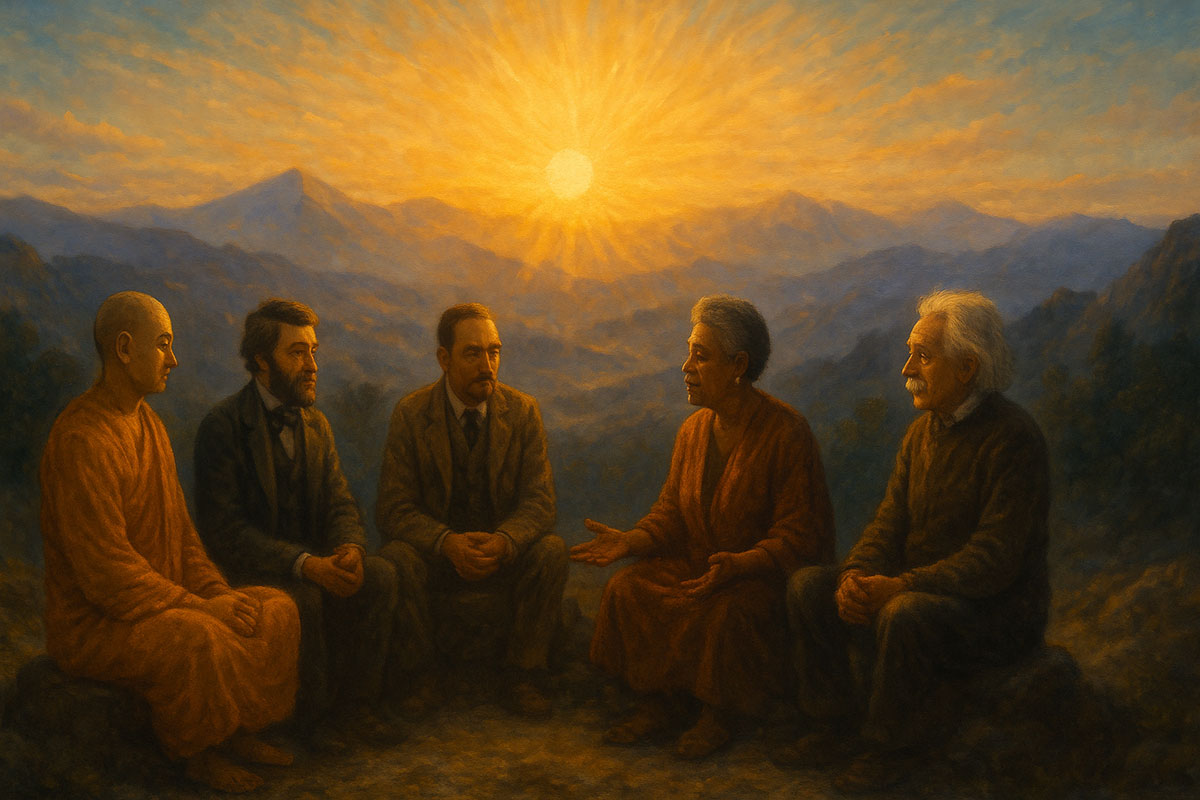
The Buddha (Moderator)
Long ago, I taught: “Do not dwell in the past, do not dream of the future, concentrate the mind on the present moment.” Yet men and women rush, worry, regret, and rarely taste the now. Let us begin: Why do humans resist the present moment?
Henry David Thoreau
Because they are intoxicated by busyness. I went to Walden Pond to strip life to its essentials. Yet I saw that most men live lives of quiet desperation, forever chasing tomorrow or nursing yesterday. They resist the present because it feels too plain—until it is gone.
Maya Angelou
They resist because the present is honest. You can’t hide in it. The past can be rewritten, the future can be fantasized, but the present is naked. It tells you who you are right now, with no excuses. And that truth can be frightening.
Albert Einstein
Humans resist the present because they misunderstand time. They imagine it as a line—past, present, future. But in truth, all is woven. The now is the only point you can touch, yet they waste it trying to grab what is beyond reach. It is a tragic illusion.
Rainer Maria Rilke
They resist because they are impatient with mystery. The present contains unanswered questions, tender and raw. They rush past it, hoping the future will deliver clarity. But life’s beauty is in the questions themselves: “Be patient toward all that is unsolved in your heart, and try to love the questions themselves.”
The Buddha
Busyness, fear of truth, illusion of time, impatience with mystery. All these cloud the moment. Then let me ask: If one truly embraced the present, what would they discover?
Maya Angelou
They’d discover joy—simple, undiluted joy. A laugh with a child, the taste of fresh bread, the sun on your face. Joy doesn’t live in yesterday’s regrets or tomorrow’s promises. It’s right here. To embrace now is to open the door to gratitude.
Albert Einstein
They’d discover freedom. When you are present, you are not imprisoned by the past, nor enslaved by the future. You stand at the only point where choice exists. That is where creativity is born. Every theory I discovered came not from worrying about tomorrow, but from curiosity in the present.
Henry David Thoreau
They’d discover sufficiency. To sit in a cabin, to eat a bean boiled over a fire, to hear the loon’s call across the pond—these are riches. The present is enough. One who embraces it discovers they already have what they sought.
Rainer Maria Rilke
They’d discover intimacy. The present is a hand extended. To meet it is to meet God, not in temples or theories, but in the trembling of this breath, the hush of this twilight. To embrace now is to fall in love with existence itself.
The Buddha
Yes. Joy, freedom, sufficiency, intimacy. Then let us end with this: What lesson should humanity carry into tomorrow about living in the present?
Albert Einstein
That time is an illusion, but the now is real. If you squander the present, you squander the only reality you possess.
Maya Angelou
That if you don’t sing today’s song, tomorrow will not remember it for you. Live boldly, love fiercely, laugh loudly—today.
Rainer Maria Rilke
That the questions of life will never be solved in advance. Live the questions now, and you may live your way into the answers.
Henry David Thoreau
That simplicity is not poverty, but wealth. Strip away distraction, and you will find the present rich enough for a lifetime.
The Buddha
That the present moment is the only path to liberation. Be awake now. Walk now. Love now. There is no other time.
(The stage quiets. A sunrise spreads across the backdrop, golden light flooding the figures. They stand not as sages of separate ages, but as voices converging on one truth: life is a gift, and its only doorway is the present.)
Final Thoughts By Maya Angelou

My dear ones,
you have heard the voices of the great,
you have listened as they wrestled with time, wealth, truth, love,
and the present moment.
But do not let this remain only a dialogue among the dead.
Let it live in you.
Because what God asked them,
God asks you now:
What will you do with the days you are given?
Will you spend them running after shadows,
or will you rise to meet the light?
Will you choose the mask,
or will you dare to be real?
Will you hoard,
or will you love?
Remember this—
every heartbeat is a drumbeat of eternity.
Every moment is a gift,
waiting for you to unwrap it with gratitude.
When your time comes to leave this world,
may it be said not only that you lived,
but that you loved,
that you were kind,
that you were truly here.
Because that, my friends,
is the only wealth
that will follow you home.
Short Bios:
Marcus Aurelius — Roman emperor (121–180 CE) and Stoic philosopher, author of Meditations, known for his reflections on mortality, discipline, and duty.
Emily Dickinson — American poet (1830–1886), whose reclusive life produced nearly 1,800 poems exploring death, eternity, and the inner world of the soul.
Steve Jobs — Co-founder of Apple (1955–2011), visionary entrepreneur who emphasized creativity, simplicity, and urgency in life shaped by awareness of mortality.
Rumi — Persian mystic and poet (1207–1273), whose ecstatic verses celebrate divine love, the soul’s eternity, and the beauty of presence.
Socrates — Classical Greek philosopher (470–399 BCE), champion of inquiry and authenticity, who taught that the unexamined life is not worth living.
Hippocrates — Greek physician (c. 460–370 BCE), known as the father of medicine, who emphasized balance, prevention, and natural healing.
Benjamin Franklin — American statesman, inventor, and writer (1706–1790), whose wit and wisdom shaped modern views on industry, prudence, and virtue.
Simone Weil — French philosopher and mystic (1909–1943), who wrote about suffering, justice, and the spiritual dignity of labor and compassion.
Buddha (Siddhartha Gautama) — Indian prince turned spiritual teacher (5th–4th century BCE), founder of Buddhism, who taught the Middle Way and liberation from craving.
Leonardo da Vinci — Italian Renaissance polymath (1452–1519), painter, inventor, and scientist, who sought harmony between art, nature, and the human body.
Søren Kierkegaard — Danish philosopher (1813–1855), father of existentialism, who explored authenticity, faith, and the dangers of “the crowd.”
Virginia Woolf — English writer (1882–1941), modernist novelist and essayist, known for A Room of One’s Own and explorations of inner truth.
Mahatma Gandhi — Indian leader (1869–1948), pioneer of nonviolent resistance (satyagraha), who lived simply and preached truth as the path to freedom.
Oscar Wilde — Irish playwright and wit (1854–1900), famous for his brilliance, irony, and reflections on masks, hypocrisy, and beauty.
Confucius — Chinese philosopher (551–479 BCE), whose teachings on virtue, ritual, and harmony shaped East Asian culture for centuries.
Leo Tolstoy — Russian novelist (1828–1910), author of War and Peace and Anna Karenina, who later embraced spiritual simplicity and nonviolence.
Mother Teresa — Catholic nun and missionary (1910–1997), founder of the Missionaries of Charity, devoted to serving the poorest of the poor in Calcutta.
Martin Luther King Jr. — American civil rights leader (1929–1968), preacher and activist, who championed nonviolent resistance and the transformative power of love.
Rabindranath Tagore — Indian poet, philosopher, and Nobel laureate (1861–1941), whose works celebrated beauty, spirituality, and universal humanism.
Eleanor Roosevelt — First Lady of the United States (1884–1962), diplomat, and advocate for human rights, instrumental in drafting the Universal Declaration of Human Rights.
The Buddha — See earlier. Moderator in Topic 5.
Henry David Thoreau — American writer and philosopher (1817–1862), author of Walden, who urged simplicity, nature, and present living.
Rainer Maria Rilke — Austrian poet (1875–1926), whose Letters to a Young Poet encouraged embracing mystery and living into life’s unanswered questions.
Maya Angelou — American poet, singer, and activist (1928–2014), celebrated for her autobiographical works and poems on resilience, dignity, and love.
Albert Einstein — German-born physicist (1879–1955), creator of the theory of relativity, who also wrote profoundly on wonder, simplicity, and the mystery of life.

Leave a Reply